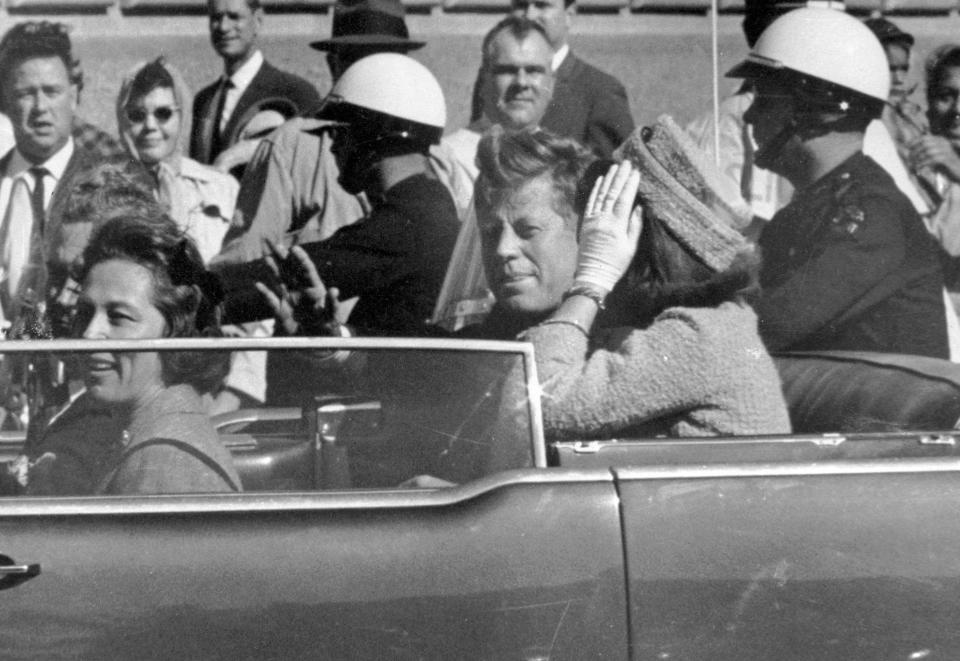JFK files: What we know about another delay in the release of assassination records
President Joe Biden last week again stalled the release of government records about the assassination of former President John F. Kennedy Jr., blaming the COVID-19 pandemic for the latest delay.
By law, all government records about Kennedy’s killing on Nov. 22, 1963, were to be made public by Oct. 25, 2017, but former President Donald Trump and now Biden both have taken steps to delay the release of the remaining files.
Only a fraction of documents related to Kennedy's assassination remain undisclosed. In a Friday memo, Biden said those documents now would be released in two waves: one later in 2021, and another by Dec. 15, 2022.
The decision to delay the release of the remaining records came just before the Oct. 26, 2021, deadline imposed by Trump in 2018 during the last batch of disclosures about Kennedy’s assassination.
Here is what we know about the remaining records yet to be released.
JFK Assassination Records Collection Act of 1992
In 1992, Congress passed the JFK Assassination Records Collection Act of 1992 to create a review process for the release of records related to Kennedy’s killing shortly after Oliver Stone’s 1991 movie "JFK" raised questions about the secrecy of the documents.
That law, signed by President George H.W. Bush, required that government records related to the assassination be funneled to the National Archives and Records Administration and created a records review board to determine which documents would be withheld.
It also set a 25-year deadline to disclose any withheld assassination records. That created the disclosure deadline for Oct. 26, 2017. However, the law also granted power to the president to continue withholding documents if their release created national security concerns that outweighed the public interest.

Most Kennedy assassination records already have been disclosed
The vast majority of assassination records already have been disclosed, according to the National Archives.
The entire cache of records assembled at the National Archives was about 5 million pages. About 88% of those records are open in full. That leaves about 12% that have not been released in full.
About 11% have been released with redactions of “sensitive portions,” according to the National Archives. That leaves 1% of assassination-related documents that have never been released.
In 2017 and 2018, the National Archives released thousands of pages of records, though many of them contained redactions. Its last release on April 26, 2018, contained more than 19,000 documents.
More: JFK files: Highlights from 2,800 previously classified records
The National Archives has said it assumes “much of what will be released will be tangential to the assassination events.”
Further delays in release of assassination records
In 2017, Trump said he would release the documents but later delayed disclosure on some of the files using the power afforded the president in the 1992 law requiring the documents be made public.
Trump cited national security concerns in his April 2018 decision and ordered a re-review of any redactions on documents over the next three years. He set a new deadline of Oct. 26, 2021, to release undisclosed documents.
As that deadline approached, Biden’s administration stalled the release again, citing the coronavirus pandemic. In an Oct. 22 memo, Biden said the National Archives needed more time, with the Archivist of the United States reporting “unfortunately, the pandemic has had a significant impact on agencies.”
The memo did not explain what effect the pandemic had on preparing the records for release.
Some records will be released before the end of the year, but Biden extended the deadline for others to Dec. 15, 2022.
Kennedy nephews call for release of assassination records
The delays have been rebuked by those who think they should be disclosed.
Two of Kennedy’s nephews, anti-vaccine activist Robert F. Kennedy Jr. and former Rhode Island Rep. Patrick Kennedy, told Politico that they believed the documents should be released.
“I think for the good of the country, everything has to be put out there so there’s greater understanding of our history,” Patrick Kennedy told Politico.
That followed a letter to Biden from seven members of Congress urging the president to release the records.
“Democracy requires that decisions made by the government be open to public scrutiny. Yet excessive secrecy surrounding President Kennedy’s assassination continues to inspire doubt in the minds of the American public and has a profound impact on the people’s trust in their government. Only by unsealing these records can our country live up to its ideals as an open society and resolve this painful moment in American history,” they wrote in their Oct. 7 letter. The letter was signed by Reps. Anna Eshoo, Steve Cohen, James McGovern, Jamie Raskin, Sara Jacobs, Joe Neguse and Raul Grijalva.
This article originally appeared on USA TODAY: JFK files: Biden delaying release of assassination records

 Yahoo Movies
Yahoo Movies 
